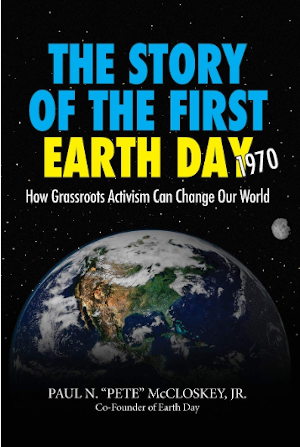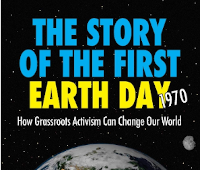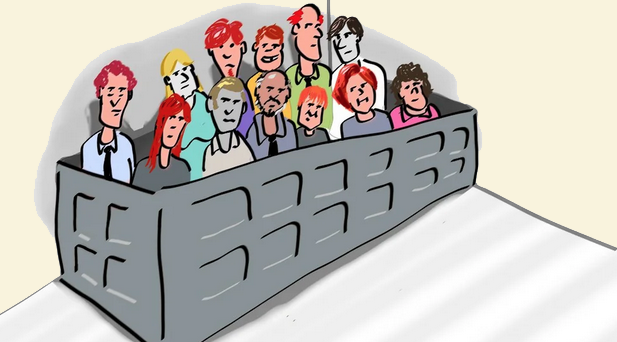— from Jan Ehrlichman and Mark Mayer —
The Story of the First Earth Day, 1970
How Grassroots Activism Can Change Our World
Paul N. “Pete” McCloskey, Jr.

This short book begins by establishing the historical setting in 1970, describing the status of the Vietnam War, civil rights activism and the lack of environmental awareness in our country.
Senator Gaylord Nelson of Wisconsin and student activist Denis Hayes joined forces to follow up on Nelson’s novel idea to instigate a nation-wide teach-in about the state of the environment in April of 1970, similar to the anti-war protests. McCloskey goes on to document Nelson and Hayes’ formation of an organization to create the first ‘Earth Day’.
Nelson’s idea was that this was to be a student-run operation. Hayes opened an office in Washington DC and he and a few young people started to contact student leaders at universities around the nation, asking them to consider holding teach-ins on April 22,
The public interest was so great that high schools, grammar schools and citizen groups all over the country wanted to be involved.
“Thus did Earth Day come into being on the sunny spring day of April 22, 1970. Twenty million people (this is one tenth of the population at that time) were estimated to participate, cleaning trash from beaches and marshes, listening to speakers on pollution, and thinking of further actions they could take to improve our environment.”
The outcome of the first Earth Day was that there began to be a much greater awareness of all aspects of our environment. A new organization was formed called “Environmental Action.” One of its early successes was to target 12 congressmen who were anti-environment in their voting records. Seven of these 12 congressmen would go on to lose their next elections. Nixon established the Environmental Protection Agency in December of 1970. McCloskey goes on to list the laws that were enacted to protect
the environment during the next decade.
Climate change certainly continues to be a huge threat in the world, and McCloskey presents factual information about this threat. The last two chapters are a sad accounting of the lack of progress in dealing with the threat of climate change. He points out that this is due to a lack of leadership, listing 25 environmental acts significantly weakened by Trump. McCloskey closes with this sentence: “Given the Trump Administration’s attempts to repress scientific opinion, there are lots of minds that will
have to change and vote accordingly.” (See a recent essay with Denis Hayes in the Seattle Times.
We recommend this informative read, especially in celebration of Earth Day. Darvill’s will have copies at $10 a piece.
**If you are reading theOrcasonian for free, thank your fellow islanders. If you would like to support theOrcasonian CLICK HERE to set your modestly-priced, voluntary subscription. Otherwise, no worries; we’re happy to share with you.**









During the Vietnam war protests there were the obvious protest signs such as “Get Out of Vietnam Now” or “Bring Our Troops Home Now” or “How Many Dead This Week Nixon?”. And then there started to appear other signs such as “Earth Day Every Day”; “Save The Earth”; “Climate Change Is Real”; “Trust Your Mother”; “There Is No Plan(et) B”. As teachers we enjoyed taking our classes out to the beach or into the forest. Long time ago but still fresh in my mind.